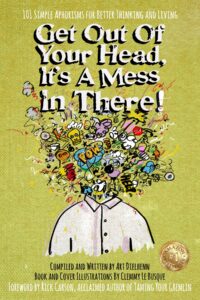NO! I DON’T WANNA!
by Art Dielhenn, CPCC
Procrastination is the heartbeat of instability, creating chaos both internally and externally. It can be driven by the fear of doing, saying, or asking for what you need or want. Sometimes it’s the fear of failure. There is much unmanageability in procrastination. “The mind is very comfortable with becoming something tomorrow.” Sadly, the long-term results can be devastating.
Life’s needs can be suppressed, repressed, or flat-out denied, creating a huge traffic jam deep inside that exacts a huge psychological and emotional toll. The more I procrastinate, the more things are left undone or unresolved, the more anxious I get, producing more dysfunction, stress, and paralysis dragging me into a swamp of self-loathing.
After procrastinating for far too long, I become disgusted with myself, not to mention angry. The anger fuels my intention to complete all the crap I’ve been avoiding. So, I get to work and before I know it, eureka! It’s done and I feel better, I feel lighter, I feel freer. I wonder why it took me so long, driving myself crazy in the process.
Courage in action is one of life’s true measures. When you procrastinate, what’s really going on?
Fear? Fear of failure is common—if you never try, you can’t fail. So you keep delaying whatever’s hanging over your head. And there’s also the fear of success. What if you complete that loan application, get the money, and grow your business beyond your wildest dreams? Are you afraid you wouldn’t be able to handle the growth, that you won’t have time for your family, that you’d have to give a big speech at your next industry conference? Figure out what you’re afraid of. If the fear is unfounded, it’ll become obvious. If it’s telling you something important—then listen carefully and deal with it.
Burnout? Maybe you’re losing traction because you’re fried. Your gig is starting to feel like a grind. You’re tired and have lost your enthusiasm and motivation. If you can take a break and refresh, great. But if you need to forge ahead then you need new approaches and new strategies. You need some re-imagining at the very time you feel the least capable of it.
Learning Curve? We often delay getting started if a project is above our pay grade or comfort zone. There are a few solutions here. Delegate the project to someone competent or become competent yourself. If the skill will benefit you in the long run, it might be worth having in your skill set. Take a class, study the subject online, or get a colleague to coach you. If the skill is not in your wheelhouse then hand it off and focus on your strengths.
 Distraction? There are tons of distractions in the average worker’s day—from urgent crises to folks dropping by your office, to wandering the internet, to the temptations of the fridge or to your partner’s needs (if you both work at home). Keep your blinders on, set a time to start on the project, treat it like a meeting with your most important client, and eliminate distractions however you need to—whether by turning off your email and phone, shutting your office door, or working from a neutral quiet location
Distraction? There are tons of distractions in the average worker’s day—from urgent crises to folks dropping by your office, to wandering the internet, to the temptations of the fridge or to your partner’s needs (if you both work at home). Keep your blinders on, set a time to start on the project, treat it like a meeting with your most important client, and eliminate distractions however you need to—whether by turning off your email and phone, shutting your office door, or working from a neutral quiet location
Overwhelm? When you try to work on the dreaded project, does your brain start buzzing with a zillion other things you need to do? Do you get overwhelmed and not know where to start? Do a “brain dump” and write down every “to do” that’s racing through your head. Then prioritize the list and focus on what’s most important right now.
Complexity? Sometimes a project seems too big and complicated to start let alone complete. (Often, I shelve these puppies awaiting inspiration. Sometimes it takes time to work up the courage to start.) If you’re staring down a project with a million moving parts, begin by breaking it into large categories. Then break those categories into subcategories. Then break those sub-categories into action steps. Then break those action steps into smaller action steps. By then things should be more manageable. Complete at least three small action steps every day. After a month you will have taken 90 steps. They add up fast.
Emotion? My emotions stop me more times than I would like to admit. I have an inner voice that isn’t always kind. It triggers emotions that dampen my enthusiasm. At these times I must notice that I’m being attacked by my thoughts and that most of them are not true. My untethered thinking can be my worst enemy. I’ve learned not to trust it blindly. Once noticed, I must ground myself in what I really want to do and accomplish.
Am I Worthy? Do I deserve what I want? This question is often the reason I’m stalling. And regrettably, it’s not always obvious. It’s a hidden obstacle regulated by my mood, feelings, level of success, or other contributing factors. Generally, I have to ask the question, “how am I feeling about myself today?” Somewhere in that answer are clues to my antipathy. Being brutally honest about the answer, lays the groundwork for what comes next. How I feel about yourself is highly correlated with how I falter or progress; fail or succeed. 
************************
Art Dielhenn, CPCC
Art Dielhenn is a certified career coach living in Los Angeles and founder of Los Angeles Coaching, which has been Elevating Creative Careers & Business since 1999. Prior to coaching, he enjoyed a fulfilling, three-decade long career as an A-list Hollywood TV director of both public and commercial television.
Much of his book Get Out Of Your Head, It’s A Mess In There is graced by the thoughts, ideas, and writings of others. It’s a synthesis of whatever Art has learned, picked up, or been gifted over the years. He has tried to give credit where credit is due. Any omissions were unintentional and the result of not being able to track down and credit the worthy source.
For more information go to: www.losangelescoaching.com
